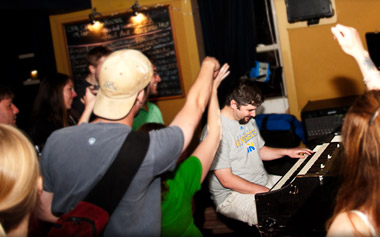In this year’s Grand Band Slam, a curious thing happened. A large number of the bands, when asked what other Valley musician they looked up to, named the same musician. It’s happened before, when lots of well-deserved props went to Ray Mason, who’s often dubbed the venerable “elder statesman” of the Valley scene. In fact, Mason has all but had a lock on the title of “most widely respected” for years.
This time, a much younger musician and relative newcomer got the nod: Beau Sasser. It’s unusual for someone who’s the same age as many local players to be acknowledged so universally. It’s also unusual for someone with an uncommon instrument to be so praised: Sasser is an organist.
Not, mind you, the sort who commands the massive brand of organ that rattles teeth in cathedrals. Sasser is, rather, a jazz-funk organist, the sort who oversees a deep-rooted groove with a pedigree stretching back to giants of the funk and jazz traditions, from Melvin Sparks and Jimmy Smith to James Brown and P-Funk.
As a player with major bona fides in the jazz/funk tradition—he toured in Sparks’ band—Sasser gets big points for musicianship. But when you speak to Sasser, it’s quickly clear that, musicianship or no, he’s an easy guy to like: “I’m a talker!” he cheerfully admits.
And it’s true. Sasser slides amicably into conversation, and has a lot of well-thought opinions about the kind of music he plays.
His garrulousness seems to inform his other job (he sells real estate), but second job or no, Sasser is a highly regarded and much sought-after musician who maintains lots of projects and brings a finely honed musical sense to all of them.
After discovering jazz in high school, Sasser studied at the University of Miami, then followed many of his friends to Boston’s Berklee School of Music. What happened there determined much of what he’s ended up playing. “At Berklee, they had a gospel choir and Hammond organs,” says Sasser. “I started gravitating toward [the organ]. I started practicing on it. It took four or five years of messing around with it to really get it.”
Part of “getting it” was learning to use the left hand to keep a driving bass part going underneath the high notes. “I grew up playing classical piano, and I was lucky for my classical background,” Sasser says. “A lot of [classical] involves playing counterpoint, left and right. I applied it to jazz, and starting playing left-hand bass parts. It was, in a way, stemming from playing Bach inventions. I worked on jazz standards playing left hand that way.”
In Boston, he joined the project he’s played with for a decade, Akashic Record. “That’s my wheelhouse as far as funk music is concerned,” he says.
He’s got a main project with a foot in the jazz world, too. After playing in Melvin Sparks band (Sparks died earlier this year), Sasser and Sparks’ drummer formed the band Sparkplug, an ode to Sparks and to the tradition players like Sparks began. “Playing with Melvin Sparks was instrumental,” says Sasser. “It’s what gets called acid jazz, or barbecue funk. To learn from him about the history of the music was incredible. I was lucky enough to learn from him, just sitting on a plane or on a bus.”
What Sparks and others did was, in a way, straightforward. “Back in the ’60s, all they knew to do was take popular music of the day and play it instrumentally as jazz, so that’s what they did,” explains Sasser. That the result had a dead-on groove must have had something to do with its lasting power four decades later.
In yet another project, Sasser spreads the word about “barbecue funk”—you’ll find him holding court every other Wednesday night (including Oct. 5) at Bishop’s Lounge in Northampton with Alan Evans of Soulive and Ryan Hommel as the Beau Sasser Trio. Those sessions, says Sasser, began in similar sessions in Boston in which players gravitated toward “the Great American organ songbook—40 or 50 tunes in this style that most musicians know.”
That same material is highly likely to appear at the Bishop’s Wednesday sessions, and Sasser enjoys spreading the style with players who sit in, some of whom, he says, have gone on to start other area sessions. “We’ve got many different musicians coming through,” Sasser says, “and if you have a passion for this music, we need you.”
Sasser’s passion for the organ in general and the Hammond in particular raises one main question: why the Hammond organ, not the Wurlitzer, say, or the Vox?
“I think it stems from gospel and church tradition, where the Hammond was the popular instrument,” Sasser says. “That was the instrument a lot of musicians grew up playing, so the Hammond and the Leslie [rotating] speaker is what became standard.
“A lot of those musicians from the ’60s—Melvin Sparks from Houston, Lou Donaldson from North Carolina—that’s what they knew, so that’s what [their bands] played.” Sasser goes on to explain that the Hammond moved on from churches and funk bands to the world of rock in the ’70s.
“They did experiment in the early 60s with Vox and Wurlitzer and other organs,” explains Sasser. “But when all was said and done, people wanted the sound and the warmth of the Hammond organ. I think the right choice was made!”
Sasser believes the organ’s bass capabilities added to its charm as a trio instrument: “I think the trio is so much more dynamic, light on its feet in comparison to this type of music with a bass player. I think they liked the simplicity.”
Sasser pauses, then adds with a chuckle, “And you don’t have to hire a bass player!”
You can see Sasser at two shows this week: Sept. 30 at the Iron Horse in Northampton with Akashic Record (and Groove Shoes) and Oct. 5 at Bishop’s Lounge in Northampton with Alan Evans and Ryan Hommel. Check www.beausasser.com for more.



